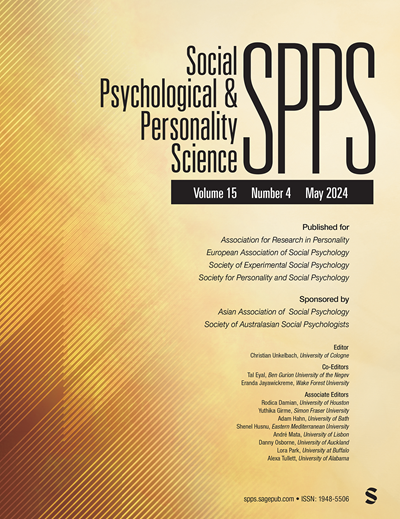A Systematic Study of Ambivalence and Well-Being in Romantic Relationships
IF 3.3
2区 心理学
Q1 PSYCHOLOGY, SOCIAL
引用次数: 1
Abstract
People in close relationships can, and often do, experience ambivalence (i.e., mixed feelings) toward their romantic partner. Although ambivalence is common and consequential, research on this phenomenon is fragmented. The present work examines how four different types of ambivalence (i.e., objective, subjective, implicit-explicit, and implicit ambivalence) relate to well-being. In four intensive studies ( N = 1,134) and internal meta-analyses, ambivalence was related to lower personal and relational well-being, but this association was only statistically significant for explicit (i.e., objective and subjective) types of ambivalence, with subjective ambivalence showing the strongest association, particularly for relationship outcomes. This work is the first systematic study of ambivalence and well-being in relationships and highlights the importance of capturing mixed feelings in relationship research and how such focus can benefit research on attitudinal ambivalence and well-being more broadly.恋爱关系中矛盾心理与幸福感的系统研究
处于亲密关系中的人可能,而且经常会对他们的恋人产生矛盾心理(即,复杂的感情)。虽然矛盾心理是普遍和必然的,但对这一现象的研究是碎片化的。目前的工作考察了四种不同类型的矛盾心理(即,客观,主观,内隐-外显和内隐矛盾心理)与幸福感的关系。在四项深入研究(N = 1134)和内部荟萃分析中,矛盾心理与较低的个人和关系幸福感有关,但这种关联仅在明确的(即客观和主观)矛盾心理类型中具有统计意义,主观矛盾心理表现出最强的关联,特别是在关系结果中。这项工作是对关系中的矛盾心理和幸福感的第一个系统研究,强调了在关系研究中捕捉混合情感的重要性,以及这种关注如何有助于更广泛地研究态度矛盾心理和幸福感。
本文章由计算机程序翻译,如有差异,请以英文原文为准。
求助全文
约1分钟内获得全文
求助全文
来源期刊

Social Psychological and Personality Science
PSYCHOLOGY, SOCIAL-
CiteScore
12.50
自引率
1.80%
发文量
77
期刊介绍:
Social Psychological and Personality Science (SPPS) is a distinctive journal in the fields of social and personality psychology that focuses on publishing brief empirical study reports, typically limited to 5000 words. The journal's mission is to disseminate research that significantly contributes to the advancement of social psychological and personality science. It welcomes submissions that introduce new theories, present empirical data, propose innovative methods, or offer a combination of these elements. SPPS also places a high value on replication studies, giving them serious consideration regardless of whether they confirm or challenge the original findings, with a particular emphasis on replications of studies initially published in SPPS. The journal is committed to a rapid review and publication process, ensuring that research can swiftly enter the scientific discourse and become an integral part of ongoing academic conversations.
 求助内容:
求助内容: 应助结果提醒方式:
应助结果提醒方式:


